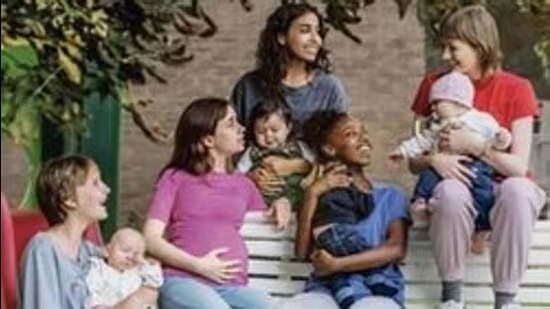DIFF review: ‘Young Mothers’ by Dardenne Brothers
No process tests the spirit like motherhood does. A body in continuous transition for nine months for humans. Even the non-mothers know that growing a foetus inside takes a toll and might even change the body’s anatomy for good. Add to this the cocktail of adolescence and you have an impending train wreck.

In Young Mothers, a French feature directed by Jean-Pierre Dardenne and Luc Dardenne – referred to as the Dardenne Brothers – and screened at the Dharamshala International Film Festival (DIFF) 2025, we have four teenagers navigating their motherhood while dealing with addiction, love, unstable parents and absent partners.
The girls – Jessica, Perla, Julie and Araine, played by Babette Verbeek, Lucie Laruelle, Elsa Houben and Janaina Halloy Fokan, respectively – live in the maternal home in Liege, Belgium, and are at the crossroads of adulthood. There is no pregnancy glow, no time for cravings, no partner to take turns to hold the baby. Just a few good women, symbolic of their own absent mothers, at a shelter, who have their backs to help them from falling into an emotional cesspool. Jessica is due any time soon, which is when she longs for her own mother who abandoned her as a child.
Perla, Julie and Araine are new mothers, their babies only a few weeks old. Perla pesters the father of the child, a teen himself, to be with them. He is dismissive of her. For Julie, the struggle is her own addiction. She distrusts herself with the responsibilities. Araine, meanwhile, understands the precarity of the life that lies ahead. Growing up with an abusive parent, she knows the repercussions her own baby might incur and wishes to give her away.
The girls want to assert themselves because they have just undergone a very adult process. However, they are scared of the consequences of their assertions which further confuse them. The girls see their relationships with their children as extensions of their longings in life, with fears of guilt and abandonment creeping in every now and then.
The phenomenal thing about Young Mothers is that the Dardenne Brothers do not delve into a singular state of being. They use the complexities of the community of teenage mothers to drive the plot. The directors are aware of the impossibility of describing the process of carrying a child so they stick to teen impulses and the actors deliver extraordinarily. Shot with a handheld camera, the scenes are intimate and often anxiety-inducing, especially because it involves weeks-old children in the arms of their “child mothers”.
The Dardenne Brothers trust their viewers with the intelligence of interpretations, which was evident from the ample conversations after the screening: Was the film about the universal question of motherhood? Was it particularly intense because of undetected post-partum showing up in individual ways? Was it about assertion of identities, which subverts the trope of a sacrificial mother?
It is difficult to arrive at conclusions after watching Young Mothers but the longing for closure is a closure in itself.


